

Use of Questionnaire-Based Measures in the Assessment of Listening Difficulties in School-Aged Children. Central Auditory Processing Disorder as the Presenting Manifestation of Subtle Brain Pathology. CaseReport Article Central Auditory Processing Disorder as the Presenting Manifestation of Subtle Brain Pathology: Problemas de procesamiento auditivo central como manifestación inicial de patología cerebral ligera 2000, Vol. 39, No. 3 , Pages 168-172 Doris Eva Bamiou, Alkis Liasis, Stewart Boyd, Mazal Cohen, and Ewa Raglan.
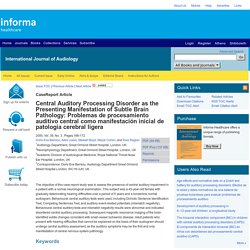
Auditory processing disorders in adults and children: Evaluation of a test battery. Original Article Auditory processing disorders in adults and children: Evaluation of a test battery: Desórdenes del procesamiento auditivo en adultos y niños; evaluación de una batería de pruebas 2003, Vol. 42, No. 7 , Pages 391-400 †Correspondence: Karin Neijenhuis, University Medical Centre Nijmegen, 811 Department of Otorhinolaryngology, PO Box 9101, 6500 HB, Nijmegen, The Netherlands k.neijenhuis@kno.umen.nl A Dutch test battery comprising six different tests for auditory processing disorders was evaluated in a group of 49 adults and children (age 8–57 years) with auditory complaints despite normal audiometric thresholds.
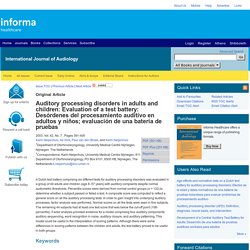
Percentile scores were derived from normal control groups (n = 132) to determine whether a subject passed or failed a test. A randomized control trial of interventions in school-aged children with auditory processing disorders. Age effects and normative data on a Dutch test battery for auditory processing disorders. Original Article Age effects and normative data on a Dutch test battery for auditory processing disorders: Efectos de la edad y datos normativos de una bateria de pruebas holandesa para evaluar problemas de procesamiento auditivo 2002, Vol. 41, No. 6 , Pages 334-346 †Correspondence: Karin Neijenhuis, University Medical Centre Nijmegen.
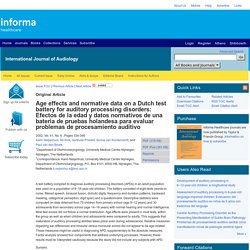
Department of Otorhinolaryngology, P.O. Box 9101, 6500 HB, Nijmegen, The Netherlands k.neijenhui.s@kno.azn.nl A test battery compiled to diagnose auditory processing disorders (APDs) in an adult population was used on a population of 9–16-year-old children. Sumario Una bateria de pruebas elaborada para diagnosticar problemas de procesamiento auditivo (APD) en adultos fue utilizada en una población de 9 a 16 años. Keywords. Aetiology and clinical presentations of auditory processing disorders—a review. Hearing is a complex process that orchestrates transduction of the acoustic stimulus into neural impulses by the ears, transmission of the neural impulses by the auditory nerves to the brain, and perceptual registration and cognitive elaboration of the acoustic signal by the brain as well as conscious perception of the sound.
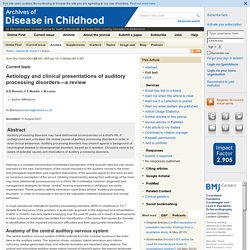
Hearing impairment(s) arising from pathology of the brain may have detrimental consequences on a child's life if untreated; however, diagnostic and management strategies for these “central” hearing impairments in childhood are rarely implemented. These auditory deficits have been collectively termed “auditory processing disorders”, in order to incorporate in the term the interaction between peripheral and central pathways.1 In terms of pathophysiological mechanisms, APD may be classified as occurring in the presence of2: neurological conditions; delayed central nervous system maturation; or other developmental disorders.
Tumours of the CANS. Central Auditory Processing Disorders - An Overview of Assessment and Management Practices. | Home | Site Search | Outreach | See/Hear Index | Spring 2000 Table of ContentsVersión Español de este artículo (Spanish Version) By Mignon M.
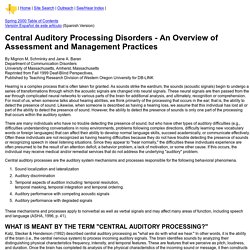
Schminky and Jane A. Baran Department of Communication Disorders University of Massachusetts, Amherst, Massachusetts Reprinted from Fall 1999 Deaf-Blind Perspectives, Published by Teaching Research Division of Western Oregon University for DB-LINK Hearing is a complex process that is often taken for granted. There are many individuals who have no trouble detecting the presence of sound, but who have other types of auditory difficulties (e.g., difficulties understanding conversations in noisy environments, problems following complex directions, difficulty learning new vocabulary words or foreign languages) that can affect their ability to develop normal language skills, succeed academically, or communicate effectively.
Central auditory processes are the auditory system mechanisms and processes responsible for the following behavioral phenomena. The Impact of Mild Central Auditory Processing Disorder on School Performance During Adolescence. On the relationship between dynamic visual and auditory processing and literacy skills; results from a large primary-school study. Auditory processing disorder in relation to developmental disorders of language, communication and attention: a review and critique. Absence of Ear advantage on the consonant-vowel dichotic listening test in adolescent and adult dyslexics: Specific auditory-phonetic dysfunction. Improving early language and literacy skills: differential effects of an oral language versus a phonology with reading intervention.